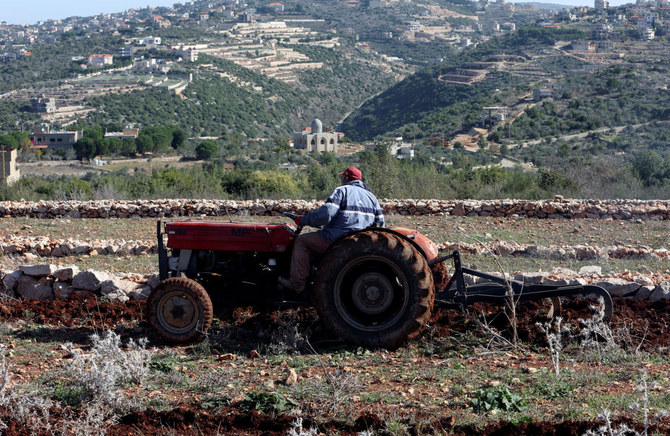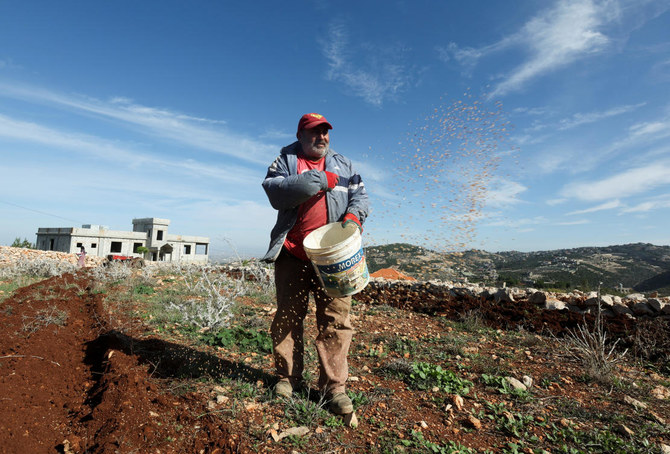YATER, Lebanon: Villagers who live off the land in south Lebanon are rushing to sow their crops, making up for lost time after weeks of hostilities with Israel forced them to miss out on the start of the planting season.
“I work from this, I produce from this, I live from this,” Zaynab Suweidan said as she sowed wheat in the village of Yater, in an area hit by Israeli strikes during heavy exchanges of fire with Lebanon’s Hezbollah.
After enduring its worst violence since a 2006 war, the area has been largely calm since Friday, when Israel and the Palestinian group Hamas agreed a temporary truce to the conflict they have been waging some 200km (120 miles) away in and around Gaza.
That war, which erupted on Oct. 7, quickly spilled into Lebanon, with the Iran-backed Hezbollah rocketing Israeli positions at the border and Israel launching air and artillery strikes in response.
Israel and Hamas agreed to extend the truce by one day on Thursday, bringing a seventh day of respite.
As a drone buzzed in the sky above her, Suweidan said she had stayed in her home throughout the hostilities even after it sustained some damage.
“Shelling has happened around us and planes launched two strikes near us, and we stayed in our house and we didn’t leave. We want to stay steadfast,” she said.
The crops should have been planted at the start of November, but she hoped the delay would not affect the yield: “Through God’s power, everything will be fine.”
Farming their land has become even more important for many in Lebanon since the economy there collapsed in a devastating financial meltdown more than four years ago.
Mousa Kawrani, a 55-year-old father of four who was planting wheat, beans and peas, said people needed to farm because they could not afford to buy everything they needed.
“We must farm. We cannot remain without farming.”
Lebanese rush to plant crops as calm prevails in south
https://arab.news/ruc9f
Lebanese rush to plant crops as calm prevails in south

- “I work from this, I produce from this, I live from this,” Zaynab Suweidan said as she sowed wheat in the village of Yater
- The crops should have been planted at the start of November
Israel strikes south Lebanon, army says Hezbollah fighter killed
The “urgent warning” was accompanied by a map showing a structure and the 500-meter radius around it marked in red
BEIRUT: Lebanese state media said an Israeli air strike hit a building in southern Lebanon on Thursday after Israel’s military issued an evacuation call warning of imminent action against Hezbollah militants.
Israel has kept up its air strikes in neighboring Lebanon despite a November truce aimed at halting more than a year of hostilities with Hezbollah that included two months of full-blown war.
Without confirming the reported attack on the southern town of Toul, the Israeli military said its forces had carried out several strikes targeting Hezbollah sites and killed one militant.
Lebanon’s official National News Agency (NNA) said that “the Israeli enemy” struck a building in Toul, where the army had warned residents to evacuate the area around a building it said was used by Hezbollah militants.
The “urgent warning” was accompanied by a map showing a structure and the 500-meter (0.3-mile) radius around it marked in red.
“You are located near facilities belonging to the terrorist (group) Hezbollah,” the statement said in Arabic, urging people “to evacuate these buildings immediately and move away from them.”
There were no immediate reports of casualties in Toul.
In a separate statement, the military said it had “struck and eliminated a Hezbollah Radwan Force terrorist in the area of Rab El Thalathine,” about 17 kilometers (10 miles) to the southeast.
The NNA reported a “martyr” in an air strike in the same area, without identifying them.
The Israeli military said its forces also “struck a Hezbollah military site containing rocket launchers and weapons” in the Bekaa Valley as well as “terrorist infrastructure sites and rocket launchers belonging to the Hezbollah terrorist organization... in southern Lebanon.”
A military statement said that “the presence of weapons in the area and Hezbollah activities at the site constitute blatant violations of the understandings between Israel and Lebanon” under the November ceasefire agreement.
Israel will “continue to operate to remove any threat... and will prevent any attempt by Hezbollah to re-establish its terror capabilities,” it said.
Under the ceasefire, Hezbollah fighters were to pull back north of the Litani River and dismantle military infrastructure south of it.
Israel was to withdraw all forces from Lebanon, but it has kept troops in five areas that it deems “strategic.”
The Lebanese army has deployed in the south and has been dismantling Hezbollah infrastructure.
The truce was based on a UN Security Council resolution that says Lebanese troops and UN peacekeepers should be the only people to bear arms in south Lebanon, and calls for the disarmament of all non-state groups.
Egyptian president, UK prime minister discuss Gaza ceasefire, humanitarian aid

- Leaders discussed Egyptian, Qatari, and US efforts to enforce ceasefire in the Palestinian coastal enclave
- Abdul Fatah El-Sisi praised ‘positive’ UK position on Gaza, agreed with Sir Keir Starmer on continuing coordination
LONDON: Egyptian President Abdul Fatah El-Sisi praised the UK’s “positive position” on developments in Gaza during a phone call with Prime Minister Sir Keir Starmer on Thursday.
The Egyptian Presidency said El-Sisi and Sir Keir discussed strengthening cooperation in the economic, trade, and investment sectors while continuing political consultations on various topics.
Ambassador Mohamed El-Shennawy, the presidential spokesman, said the two leaders discussed the situation in the Gaza Strip and Egyptian, Qatari, and US efforts to enforce a ceasefire in the Palestinian coastal enclave and ensure the flow of humanitarian aid.
The Egyptian president emphasized Cairo’s rejection of displacing Palestinians and expressed support for the Arab-Islamic plan to rebuild Gaza following a ceasefire.
El-Sisi praised the “positive” UK position regarding the situation in Gaza and agreed with the prime minister on continuing coordination to address regional and international developments.
The UK announced on Tuesday that it will stop free-trade negotiations with Israel and has summoned the Israeli ambassador to the Foreign Office in response to Tel Aviv’s expansion of military operations in Gaza.
Settler attacks push Palestinians to abandon West Bank village, residents say

- The West Bank is home to about three million Palestinians
- The Israeli military said it was “looking into” the legality of the outpost at Maghayer Al-Deir
MAGHAYER AL-DEIR, Palestinian Territories: Palestinian residents of Maghayer Al-Deir in the occupied West Bank told AFP on Thursday that they had begun packing their belonging and preparing to leave the village following repeated attacks by Israeli settlers.
Yusef Malihat, a resident of the tiny village east of Ramallah, told AFP his community had decided to leave because its members felt powerless in the face of the settler violence.
“No one provides us with protection at all,” he said, a keffiyeh scarf protecting his head from the sun as he loaded a pickup truck with chain-link fencing previously used to pen up sheep and goats.
“They demolished the houses and threatened us with expulsion and killing,” he said, as a group of settlers looked on from a new outpost a few hundred meters away.
The West Bank is home to about three million Palestinians, but also some 500,000 Israelis living in settlements that are considered illegal under international law.
Settlement outposts, built informally and sometimes overnight, are considered illegal under Israeli law too, although enforcement is relatively rare.
The Israeli military told AFP it was “looking into” the legality of the outpost at Maghayer Al-Deir.
“It’s very sad, what’s happening now... even for an outpost,” said Itamar Greenberg, an Israeli peace activist present at Maghayer Al-Deir on Thursday.
“It’s a new outpost 60 meters from the last house of the community, and on Sunday one settler told me that in one month, the Bedouins will not be here, but it (happened much) more quickly,” he told AFP.
The Palestinian Authority’s Colonization and Wall Resistance Commission denounced Maghayer Al-Deir’s displacement, describing it as being the result of the “terrorism of the settler militias.”
It said in a statement that a similar fate had befallen 29 other Bedouin communities, whose small size and isolation in rural areas make them more vulnerable.
In the area east of Ramallah, where hills slope down toward the Jordan Valley, Maghayer Al-Deir was one of the last remaining communities after the residents of several others were recently displaced.
Its 124 residents will now be dispersed to other nearby areas.
Malihat told AFP some would go to the Christian village of Taybeh just over 10 kilometers (six miles) away, and others to Ramallah.
Uncertain they would be able to return, the families loaded all they could fit in their trucks, including furniture, irrigation pipes and bales of hay.
WFP says ‘handful of bakeries’ making bread again in Gaza

- “A handful of bakeries in south and central Gaza have resumed bread production,” WFP said
ROME: The UN’s World Food Programme said Thursday a “handful of bakeries” in Gaza had begun making and distributing bread again after Israel allowed aid trucks into the Strip.
“A handful of bakeries in south and central Gaza... have resumed bread production after dozens of trucks were finally able to collect cargo from the Kerem Shalom border crossing and deliver it overnight,” the WFP said in a statement.
“These bakeries are now operational distributing bread via hot meal kitchens,” it said.
Morocco to spend $670m to replenish livestock up to 2026

- Six years of drought reduced the cattle and sheep herds by 38 percent this year
- The government also includes aid to farmers
RABAT: Morocco plans to spend 6.2 billion dirhams ($670 mln) on a 2025-2026 program to replenish its livestock herd, which has been reduced following years of prolonged drought, agriculture minister Ahmed El Bouari said on Thursday.
Six years of drought caused mass job losses in the farming sector and reduced the cattle and sheep herds by 38 percent this year, compared to the last census nine years ago.
Under the recovery program, 3 billion dirhams will be allocated in 2025 and 3.2 billion next year to measures including debt relief and restructuring for livestock farmers, as well as feed subsidies, Bouari told reporters.
The government also includes aid to farmers who retain breeding female livestock, along with veterinary campaigns, genetic improvement and artificial insemination, he said.
In February, authorities asked citizens to forgo the ritual of slaughtering sheep on the Eid Adha this year, to help restore the sheep herd.





















